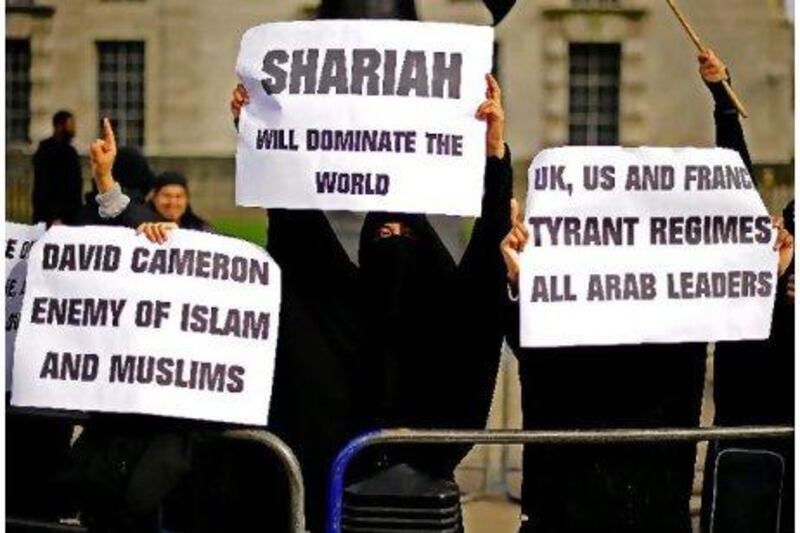LONDON // A campaign targeting Islamic groups that do not embrace "mainstream British values" will be announced by Prime Minister David Cameron's government today.
Targets will include universities where Islamic student societies are deemed to be breeding grounds for extremists, and community groups that receive government funding but are not encouraging Muslims to embrace democracy and liberal values.
The new, tough line in the Prevent programme, launched by the previous Labour government to stop the radicalisation of young Muslims after the suicide bombings on the London transport system in 2005, represents a victory for Mr Cameron over senior cabinet colleagues in the coalition government opposed to the campaign.
Several ministers, including the deputy prime minister and Liberal Democrat leader, Nick Clegg, and Baroness Sayeeda Warsi, chairman of the Conservative Party and the first Muslim woman to hold a British cabinet post, worry that radicals will be driven underground without open debates in which their views can be challenged.
But the Home Secretary, Theresa May, who will announce the revision of the counter-terrorism strategy, made it clear yesterday that there is to be a new, broader definition of extremism in Britain.
That definition is concentrated on groups condoning violence. Under the new policy, it will include non-violent Muslims who advocate the introduction of Islamic values in Britain, such as the adoption of Sharia law or the subordination of women.
About 20 groups receiving government funding under the £60 million (Dh220mn) Prevent programme will be cut off from further state subsidies.
The government also aims to curtail extremist propaganda on the internet and restrict access to radical websites from schools and libraries.
In an article in yesterday's Daily Telegraph, Mrs May also attacked universities for their "complacency" over tackling extremism on university campuses.
"I think for too long there's been complacency around universities," she wrote. "I don't think they have been sufficiently willing to recognise what can be happening on their campuses and the radicalisation that can take place".
"I think there is more that universities can do."
Mrs May told the newspaper that groups such as the Federation of Student Islamic Societies "need to be prepared to stand up and say that organisations that are extreme or support extremism or have extremist speakers should not be part of their grouping".
But Aaron Porter, president of the National Union of Students, said yesterday that the government's new approach was merely an attempt to cover up its own failings.
"Facing up to the challenges that non-violent extremism brings to campus life requires careful support and guidance from government, not wild sensationalism that only serves to unfairly demonise Muslim students," he said.
Nicola Dandridge, the chief executive of Universities UK, which represents the college authorities, told the BBC that there was "no evidence" of complacency and that a report produced by her group this year "showed the extent to which universities are engaging with the police and security services, working with student unions to try to deal with unlawful external speakers".
Ms Dandridge added that, in a free society, there was a right to have speakers on campus whose views "we may find repulsive, offensive".
"We need to have an open debate so that universities are encouraging young people to challenge these views," she said.
"If we ban those speakers, not only does it compromise freedom of speech in a significant way, but it means we drive the whole issue underground."
The Federation of Student Islamic Societies said in a statement that it had "consistently taken measured steps to engage with key stakeholders, including members of the government" over extremism at universities.
A month ago, however, a report from the Parliamentary Group on Homeland Security registered "grave concerns" that students were being radicalised at universities.
The Daily Mail reported yesterday that government research had identified 40 UK universities where extremism thrived.
It said that 30 per cent of young British Muslims involved in terrorist acts had been radicalised at university, including Umar Farouk Abdulmutallab, who tried to blow up an airliner over Detroit on Christmas Day 2009 with a bomb hidden in his underwear.
The new strategy will not ban specific groups but instead cut off funding and attempt to isolate them.
Haras Rafiq, director of the counter-extremism consultancy Centri, welcomed the tough strategy but said the main problem would be implementation.
"They need to build criteria to establish which organisation they fund has extremist views, which one doesn't, and ensure extremist groups do not receive funding from other pots," he said.






